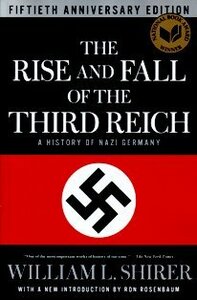Take a photo of a barcode or cover
challenging
informative
reflective
slow-paced
Highly recommend the audiobook for this book. The parallels with today's society are challenging but the book is still a must read/listen so we do not ignore the lessons from the past.
This book took me a long time to finish. Not least because I kept getting distracted by other, shorter, books. The first portion of the book, which deals with Hitler’s rise to power and the non-war years of the Third Reich was difficult for me to get through. I suspect that is due to the great amount of detail Shirer includes. (Ultimately I think this is a good thing. I have never encountered the level of detail present in these books! And much of it is from primary sources!)
As soon as the preparations for the invasion of Poland began, I was able to follow along more easily and finished the rest of the book in just a few days. Perhaps this is because I was already so familiar with how WWII happened that I was better able to organize the information in my mind? Who knows.
This book is a treasure because it lays out the history of history’s most villainous actor and the horrendous, tyrannic empire he ran into the ground. If you crave the background knowledge and political history behind epochal events like I do, you’ll enjoy this book. Just be prepared for a lot of reading.
As soon as the preparations for the invasion of Poland began, I was able to follow along more easily and finished the rest of the book in just a few days. Perhaps this is because I was already so familiar with how WWII happened that I was better able to organize the information in my mind? Who knows.
This book is a treasure because it lays out the history of history’s most villainous actor and the horrendous, tyrannic empire he ran into the ground. If you crave the background knowledge and political history behind epochal events like I do, you’ll enjoy this book. Just be prepared for a lot of reading.
challenging
informative
reflective
slow-paced
A really good, comprehensive overview of the political, social, and military aspects of fascism. It's a word that gets thrown around a lot these days, and this book made me question some of my assumptions about what it looks like functionally. Heavy on the political aspects of the Third Reich, particularly foreign policy, but the first 200 pages are a gripping study of Hitler's streets-to-government grasp of power. If you think it couldn't happen here or now, this book presents itself in a way that will force you to reconsider.
Definitely important, but weirdly homophobic?? There are for sure more objective/up-to-date options that I think I would have preferred
I was listening to it and it was sooooooo slow and monotone. I couldn't do it.
dark
informative
reflective
fast-paced
This was my first big history book, so I can't give it a super objective review...
Other reviews of this hold up. Yes, there are a lot of names and acronyms to keep up with. My best strategy for that was just to start skimming if I got confused. Within a paragraph or a page, I'd be back on steadier footing.
The homophobia is better and worse than I expected it to be. Better because the occurrences of it are less common than I thought. Worse because they are even more egregious than I expected. So here's what to actually expect -- gayness is treated as the utmost perversion. In calling a Nazi "A homosexual murderer" you know that the author weights those two words equally. It's disgusting. It's also so flagrant that you can't ignore it... which means that at least it's not an undercurrent. You forget he's homophobic until a hundred pages later, when he says some dumbass shit again, and then again, it's one line, and then he's past it. It's more common in the first third of the book. I'm not sure it comes up at all beyond the halfway point. I don't think the homophobia itself undermines the narrative, because it's scattered so sparsely, but I do think it undermines the credibility of anyone claiming to talk objectively about Nazism to carry an ideology like that with them. If you said "I will not read a book on WW2 written by a homophobe for the same reason I would not read a book on WW2 written by an antisemite" I'd say yeah, fair enough.
I'll also point out that the edition I'm reading from has an afterword from 1990, in which the homophobia is still not addressed.
I think the author is incredibly biased in a lot of ways, but I think that influences the way that he narrates and not the facts themselves. I imagine that reading any histories requires you to use your own discernment. I think there are probably a lot of WW2 histories that are better than this one. I might read some of them. It's crazy that in 1600+ pages, I feel like I only got the tiniest taste of what even went down in WW2, but I guess that's why people who study it can make a lifetime of the pursuit.
Honestly, I pushed through reading this even though there were weird vibes a lot of the time because I knew that I was only going to retain 10% of what I read, considering how little I know about ww2. I'll read the better books next and I'll be able to understand them better now that my brain has built up a bit of a timeline and made note of the major players.
Other reviews of this hold up. Yes, there are a lot of names and acronyms to keep up with. My best strategy for that was just to start skimming if I got confused. Within a paragraph or a page, I'd be back on steadier footing.
The homophobia is better and worse than I expected it to be. Better because the occurrences of it are less common than I thought. Worse because they are even more egregious than I expected. So here's what to actually expect -- gayness is treated as the utmost perversion. In calling a Nazi "A homosexual murderer" you know that the author weights those two words equally. It's disgusting. It's also so flagrant that you can't ignore it... which means that at least it's not an undercurrent. You forget he's homophobic until a hundred pages later, when he says some dumbass shit again, and then again, it's one line, and then he's past it. It's more common in the first third of the book. I'm not sure it comes up at all beyond the halfway point. I don't think the homophobia itself undermines the narrative, because it's scattered so sparsely, but I do think it undermines the credibility of anyone claiming to talk objectively about Nazism to carry an ideology like that with them. If you said "I will not read a book on WW2 written by a homophobe for the same reason I would not read a book on WW2 written by an antisemite" I'd say yeah, fair enough.
I'll also point out that the edition I'm reading from has an afterword from 1990, in which the homophobia is still not addressed.
I think the author is incredibly biased in a lot of ways, but I think that influences the way that he narrates and not the facts themselves. I imagine that reading any histories requires you to use your own discernment. I think there are probably a lot of WW2 histories that are better than this one. I might read some of them. It's crazy that in 1600+ pages, I feel like I only got the tiniest taste of what even went down in WW2, but I guess that's why people who study it can make a lifetime of the pursuit.
Honestly, I pushed through reading this even though there were weird vibes a lot of the time because I knew that I was only going to retain 10% of what I read, considering how little I know about ww2. I'll read the better books next and I'll be able to understand them better now that my brain has built up a bit of a timeline and made note of the major players.
Long, detailed, and shocking.
I found this to be one of the most engaging yet arduous books I have ever read. I battle between combing through the tiny details to then reveal the large picture.
There are hundreds of pages, describing the relocation of pieces of paper being sent around the world (if only they had email), these communications which initially seem trivial and laborious are vital in setting the scene for the drama, deceit, and destruction that fills this book.
You understand every action taken and every word spoken that could drive a small group of powerless lunatics to create the largest killing force seen in modern history.
Written well enough, for an idiot like me to understand the full picture.
If you want to know the details of the Third Reich, look nowhere else.
I found this to be one of the most engaging yet arduous books I have ever read. I battle between combing through the tiny details to then reveal the large picture.
There are hundreds of pages, describing the relocation of pieces of paper being sent around the world (if only they had email), these communications which initially seem trivial and laborious are vital in setting the scene for the drama, deceit, and destruction that fills this book.
You understand every action taken and every word spoken that could drive a small group of powerless lunatics to create the largest killing force seen in modern history.
Written well enough, for an idiot like me to understand the full picture.
If you want to know the details of the Third Reich, look nowhere else.

